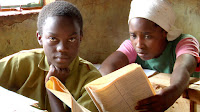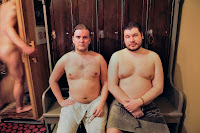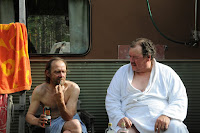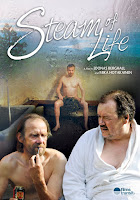 The CFC Worldwide Short Film Festival (WWSFF) kicks off on Tuesday, June 1 and runs until June 6. The best thing about this festival? Shorter is Better. With short films, if you like something it will make you yearn for more, and if you don't like what you are seeing you only have to wait a few minutes before it's on to the next one. Lucky for you, the programmers at WWSFF do an excellent job of bringing you short films from around the world that spark the imagination, generate humour, and creep you out. There is something for everyone at this festival with the programme book divided into sections with headings and brief descriptions that will help you decide whether or not that section of films will suit your taste--Slap 'N Tickle anyone? WSFF even has an iphone app to help you organize your schedule.
The CFC Worldwide Short Film Festival (WWSFF) kicks off on Tuesday, June 1 and runs until June 6. The best thing about this festival? Shorter is Better. With short films, if you like something it will make you yearn for more, and if you don't like what you are seeing you only have to wait a few minutes before it's on to the next one. Lucky for you, the programmers at WWSFF do an excellent job of bringing you short films from around the world that spark the imagination, generate humour, and creep you out. There is something for everyone at this festival with the programme book divided into sections with headings and brief descriptions that will help you decide whether or not that section of films will suit your taste--Slap 'N Tickle anyone? WSFF even has an iphone app to help you organize your schedule. AWARD WINNERS FROM AROUND THE WORLD. Tuesday, June 1st, 7PM, Bloor Cinema. Sunday, June 6th, 9:30PM. Cumberland Cinema.
AWARD WINNERS FROM AROUND THE WORLD. Tuesday, June 1st, 7PM, Bloor Cinema. Sunday, June 6th, 9:30PM. Cumberland Cinema.TUNGIJUQ is just one of the films screening at the Opening Night Gala. This Canadian film takes you deep into the arctic with throat singer, Tanya Tagaq, providing the unique musical accompaniment to this shape-shifting story. Another featured Canadian is Genie Award-winner, Cordel Baker (The Cat Came Back) with the riotous RUNAWAY. Short films from France (It's Sunday/C'est Dimanche), Sweden (Seeds of the Fall/Slitage), and New Zealand (The Six Dollar Fifty Man) rounds out the program.
 THE GREATEST LOVE OF ALL. Wednesday, June 2, 3:15PM. Friday, June 4, 8:30PM. Cumberland Cinema. THE APOSTLES is a sacrilegious scream. Gathered together for the last supper, the 12 disciples argue about the bill after Jesus leaves the table, but don't worry, the love shines through the bickering in this Canadian film. Aspects of love are explored with sensitivity, kookiness, poignancy, grief and eroticism in this selection of films from Canada (Swiftly, 5 Hole:Tales of Hockey Erotica ), Denmark (Mirror, Megaheavy), France (Nude/Nue), New Zealand (Poppy), USA (The Poodle Trainer) and the UK (Believe).
THE GREATEST LOVE OF ALL. Wednesday, June 2, 3:15PM. Friday, June 4, 8:30PM. Cumberland Cinema. THE APOSTLES is a sacrilegious scream. Gathered together for the last supper, the 12 disciples argue about the bill after Jesus leaves the table, but don't worry, the love shines through the bickering in this Canadian film. Aspects of love are explored with sensitivity, kookiness, poignancy, grief and eroticism in this selection of films from Canada (Swiftly, 5 Hole:Tales of Hockey Erotica ), Denmark (Mirror, Megaheavy), France (Nude/Nue), New Zealand (Poppy), USA (The Poodle Trainer) and the UK (Believe). WHO'S THE BOSS. Wednesday, June 2, 2:00PM. Saturday, June 5, 12:30PM. Cumberland Cinema. WINTER'S BEGINNING (Le DÉBUT DE L'HIVER) is a tale worth telling, and the dark truth of this French film may be disturbing to some, but abuse of power is an evil that can happen in our midst without us being conscious of its appearance. Not everything in this program is as unsettling as that short, and films such as the hilarious Dutch film, Drop Dead/Val Dood, the touchingly funny Swimming Lesson (Singapore) and Canadian entries Don't Walk Out That Door and The Orange bring levity to this section. The German, Painting Paradise, the Israeli, Bus, and the French film Jean François provide a good balance of drama. The Finnish, Over the Fence/Viiko Ennen Vappua broke through my bias of longer short films (it's 30 minutes) with its evenly-paced direction, well-written storyline, and the incredibly realness the actors bring to their roles.
WHO'S THE BOSS. Wednesday, June 2, 2:00PM. Saturday, June 5, 12:30PM. Cumberland Cinema. WINTER'S BEGINNING (Le DÉBUT DE L'HIVER) is a tale worth telling, and the dark truth of this French film may be disturbing to some, but abuse of power is an evil that can happen in our midst without us being conscious of its appearance. Not everything in this program is as unsettling as that short, and films such as the hilarious Dutch film, Drop Dead/Val Dood, the touchingly funny Swimming Lesson (Singapore) and Canadian entries Don't Walk Out That Door and The Orange bring levity to this section. The German, Painting Paradise, the Israeli, Bus, and the French film Jean François provide a good balance of drama. The Finnish, Over the Fence/Viiko Ennen Vappua broke through my bias of longer short films (it's 30 minutes) with its evenly-paced direction, well-written storyline, and the incredibly realness the actors bring to their roles. DORIS. Wednesday, June 3, 4:15PM. Cumberland Cinema. ATTACHED TO YOU does in 9 minutes what usually takes years to unfold. From conception to birth, adolescent and adulthood, this stop-motion animation uses clay figures to tell the story of motherhood and the strength and endurance of the mother-child bond. Thanks to Sweden's Doris Manifesto, we are able to see the result of the manifesto's aim to increase the number of films made by women with contributions by women in key creative roles in front of and behind the camera. Included in this section are The Frog (why can't a girl be a princess and wield a sword?), Rehearsal (sexuality blooms in such strange places), Mon 3 (girls sticking together), Fish (love taken to new heights amidst brilliant cinematography), Susanne Goes Single (camping can be a dangerous thing for abusive husbands), and Shoot Me (intergenerational law-breaking). Don't be fooled; this section will appeal to both men and women.
DORIS. Wednesday, June 3, 4:15PM. Cumberland Cinema. ATTACHED TO YOU does in 9 minutes what usually takes years to unfold. From conception to birth, adolescent and adulthood, this stop-motion animation uses clay figures to tell the story of motherhood and the strength and endurance of the mother-child bond. Thanks to Sweden's Doris Manifesto, we are able to see the result of the manifesto's aim to increase the number of films made by women with contributions by women in key creative roles in front of and behind the camera. Included in this section are The Frog (why can't a girl be a princess and wield a sword?), Rehearsal (sexuality blooms in such strange places), Mon 3 (girls sticking together), Fish (love taken to new heights amidst brilliant cinematography), Susanne Goes Single (camping can be a dangerous thing for abusive husbands), and Shoot Me (intergenerational law-breaking). Don't be fooled; this section will appeal to both men and women. NOT JUST FROM VENUS. Friday, June 4, 1:00PM. Saturday, June 5, 9:45PM. Cumberland Cinema. BIRTHDAY is a Swedish film about impending motherhood, retribution and love all in the span of 18 minutes--it's wickedly funny as women behave badly but honestly. Canadian entries in this section include the artful fantasy, Sometimes I Dream of Reindeer, the body-conscious, Slip, and the disturbing horror, Chloe and Attie. The Polish, Real and the UK's The Space You Leave, roots us in the present, while the Czech Republic's Homeland, bonds us to this world and beyond.
NOT JUST FROM VENUS. Friday, June 4, 1:00PM. Saturday, June 5, 9:45PM. Cumberland Cinema. BIRTHDAY is a Swedish film about impending motherhood, retribution and love all in the span of 18 minutes--it's wickedly funny as women behave badly but honestly. Canadian entries in this section include the artful fantasy, Sometimes I Dream of Reindeer, the body-conscious, Slip, and the disturbing horror, Chloe and Attie. The Polish, Real and the UK's The Space You Leave, roots us in the present, while the Czech Republic's Homeland, bonds us to this world and beyond. MIDNIGHT MANIA: CREEPY. Friday, June 4, 11:59PM. Cumberland Cinema. BATTENBERG sums up the feeling of this section--it's not scary but it is creepy. When an injured bird is asked to tea with a red squirrel there is murder afoot. Who wins? Who loses? You'll have to be at the Cumberland just before midnight to find out. The short film Jack about pumpkin revenge is just wrong! as is 5 Minute Dating, the twisted Chloe and Attie, and the demon sex short, Jardin Dead End--what is it with us Canadians? The UK's Off Season and The Elemental makes you want to rethink theft and stairwells respectively. Eveybody (USA) is off the wall while Mrdrchain is a fleshy, fascinating surrealist short that slice and dices.
MIDNIGHT MANIA: CREEPY. Friday, June 4, 11:59PM. Cumberland Cinema. BATTENBERG sums up the feeling of this section--it's not scary but it is creepy. When an injured bird is asked to tea with a red squirrel there is murder afoot. Who wins? Who loses? You'll have to be at the Cumberland just before midnight to find out. The short film Jack about pumpkin revenge is just wrong! as is 5 Minute Dating, the twisted Chloe and Attie, and the demon sex short, Jardin Dead End--what is it with us Canadians? The UK's Off Season and The Elemental makes you want to rethink theft and stairwells respectively. Eveybody (USA) is off the wall while Mrdrchain is a fleshy, fascinating surrealist short that slice and dices. SHORTS FOR SHORTIES: THE GREAT CHASE. Saturday, June 5, 12:00PM. AGO(Art Gallery of Ontario). THE INCREDIBLE STORY OF MY GREAT GRANDMOTHER OLIVE.You have got to see what Great Grandmother gets up to in this age-empowering short. Always the best section of the festival. You can never go wrong with short films for children, and the best are always selected by this festival's programmers, who I'm sure must enjoy every minute putting this section together. Eight other selections round out this program that at 61 minutes is perfect for shorter attention spans. Age recommendation 6+. FREE FOR CHILDREN UNDER AGE 12. Don't forget to sign up for the Workshop with Jon Izen.
SHORTS FOR SHORTIES: THE GREAT CHASE. Saturday, June 5, 12:00PM. AGO(Art Gallery of Ontario). THE INCREDIBLE STORY OF MY GREAT GRANDMOTHER OLIVE.You have got to see what Great Grandmother gets up to in this age-empowering short. Always the best section of the festival. You can never go wrong with short films for children, and the best are always selected by this festival's programmers, who I'm sure must enjoy every minute putting this section together. Eight other selections round out this program that at 61 minutes is perfect for shorter attention spans. Age recommendation 6+. FREE FOR CHILDREN UNDER AGE 12. Don't forget to sign up for the Workshop with Jon Izen. DRAWING WORKSHOP: CREATE CARTOONS! with award-winning artist, JON IZEN. Saturday, June 5, 1:30PM - 3:30PM. AGO(Art Gallery of Ontario). Age recommendation 8+. Maximum participants 15. First come-First served. $10 dollar with ticket stub from SHORTS FOR SHORTIES. Izen's work, Yam Roll screens as part of the Shorties program.
DRAWING WORKSHOP: CREATE CARTOONS! with award-winning artist, JON IZEN. Saturday, June 5, 1:30PM - 3:30PM. AGO(Art Gallery of Ontario). Age recommendation 8+. Maximum participants 15. First come-First served. $10 dollar with ticket stub from SHORTS FOR SHORTIES. Izen's work, Yam Roll screens as part of the Shorties program. LUNAFEST. Sunday, June 6, 2:15PM. Cumberland Cinema. A VIDA POLITICA. Black is beautiful, and if you don't think so then what do you know. This is the attitude of the Brazilian hair salon owner in this too short (3 minutes) film about social activism and hairdressing. Exploring girlhood (Israeli entry, A Summer Rain) to elderhood (US entry, The McCombie Way) this selection of films are all made by women, but don't let that stop you male readers from attending. You don't want to miss The Kinda Sutra where adults recount how they were told where babies came from, or Courtney Cox's film, Monday Before Thanksgiving, which stars her friend, Laura Dern. Other fabulous films include the comic Australian first date film, Plastic, the touching drama, Roz (and Joshua) and the revealing Anjali (both American entries) and the Bulgarian, Omelette. Warning: don't blink or you will miss the one-minute statement about the bicycle. A fantastic section of films.
LUNAFEST. Sunday, June 6, 2:15PM. Cumberland Cinema. A VIDA POLITICA. Black is beautiful, and if you don't think so then what do you know. This is the attitude of the Brazilian hair salon owner in this too short (3 minutes) film about social activism and hairdressing. Exploring girlhood (Israeli entry, A Summer Rain) to elderhood (US entry, The McCombie Way) this selection of films are all made by women, but don't let that stop you male readers from attending. You don't want to miss The Kinda Sutra where adults recount how they were told where babies came from, or Courtney Cox's film, Monday Before Thanksgiving, which stars her friend, Laura Dern. Other fabulous films include the comic Australian first date film, Plastic, the touching drama, Roz (and Joshua) and the revealing Anjali (both American entries) and the Bulgarian, Omelette. Warning: don't blink or you will miss the one-minute statement about the bicycle. A fantastic section of films.The above films are just a sample of what WWSFF has to offer, there are hundreds of shorts on offer, and other aspects of the festival that (the symposiums for one) to check out. Buy tickets and get all the information you need on their website.
CFC Worldwide Short Film Festival
June 1 - 6
Web: www.shorterisbetter.com



























